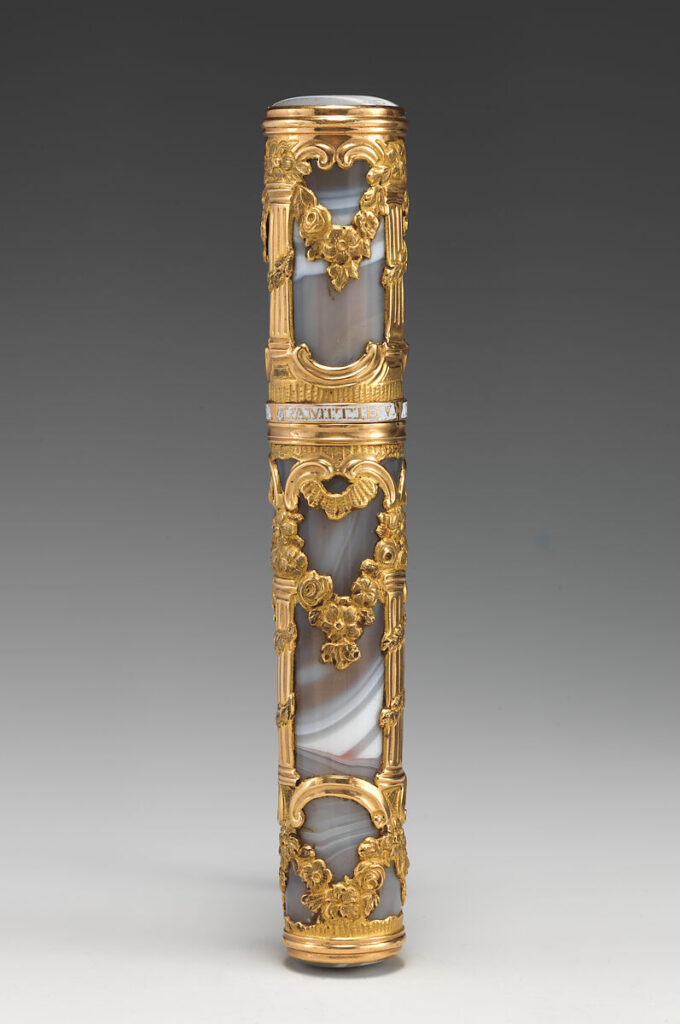From the wide-ranging and customarily sane Virginia Postrel over at Reason comes a summer bijou: Gadgets and gizmos from Adam Smith’s time.
Let’s start with what the self-respecting man about town might have carried with him as he set out for the day.
First and all but non-negotiable was a watch, tucked in a front pocket and attached to a chain (or strap or ribbon). They were not only for the upper classes, but sailors and farm hands as well–often bought second-hand from pawnshops and bartered back to whence they came if money was tight. Pickpockets’ A #1 target.
But watches barely scratched the surface of the well kitted out man about town. How about:
- A nutmeg grater to add spice to one’s coffee at the ever popular coffee-house (the original mecca for merchants to congregate and engage in exchange–with different coffeehouses specializing in different trades).
- A “pocket globe” (the imagination struggles to square the object with the available pockets and pouches on anything approaching a garment you could actually wear).
- Or, with echoes down the centuries to today’s largest and most impractical Swiss Army knives, what antiquarians refer to as etuis: Think of an oversized cigarette lighter typically covered in a textured rawhide made from shark or ray skin (known as shagreen), which opened to display a variety of miniature (we mean “miniature”) tools such as tweezers, a ruler and compass, pen nibs, perhaps if the need for a snack came along, dollhouse size versions of a fork, knife, and snuff spoon, a bodkin, a super-miniature bottle of cologne, and the all-important “ear wax scraper” (your reporter does not want to inquire further about this last item).
- And if the etui in question were cylindrical, the cap could usefully double as a mini spyglass. James Bond had nothing on these well-equipped fellows.
Capital of manufacturing for these engaging and barely resistible miracles of miniaturization was Birmingham, where a 1767 dictionary identified 100 “toy makers,” declaring that “For Cheapness, Beauty and Elegance no Place in the world can vie with them.”
But under the skein of whimsy and undeniable “aptness” (Smith’s term) of these ingenious micro-tools lay temptation, which tells us something about the appeal of wealth and “conspicuous consumption” to this day. The Earl of Chesterfield, in a 1749 letter to his son, cautioned that a fool “cannot withstand the charms of a toyshop; snuff-boxes, watches, heads of canes, etc., are his destruction.” A year later he doubled down on this advice:
“There is another sort of expense that I will not allow, only because it is a silly one,” he wrote. “I mean the fooling away your money in baubles at toy shops. Have one handsome snuff-box (if you take snuff), and one handsome sword; but then no more pretty and very useless things.” A fortune, Chesterfield cautioned, could quickly disappear through impulse purchases.
In his magisterial and vastly underappreciated Theory of Moral Sentiments, Smith also took up the topic, although he advanced the implications considerably. While these “toys” embodied “the beauty of order, of art and contrivance,” ingenuity and precisions, they were also undeniably cool. The same pattern of striking desire into the hearts of others applied to wealth itself. Smith invokes a vision of an impoverished but ambitious young man (well, he would have been inevitably a man, then, of course), who fantasizes that if only he possessed a large mansion, coaches, and servants to attend to it all, would his life run happily and smoothly.
And suppose our quondam protagonist achieves these objects of desire? With the possessions and the servants, and family and friends and hangers-on, come anxiety, world-weariness, and exhaustion. Finally in old age
“he begins at last to find that wealth and greatness are mere trinkets of frivolous utility, no more adapted for procuring ease of body or tranquillity of mind than the tweezer-cases of the lover of toys.”
But Smith meant no condemnation: To the contrary, he was laying the groundwork for what the pursuit of wealth–and the improvement of land, productive deployment of capital, and the creation of worthy and respectable employment–lay the groundwork for and propel orderly and comfortable civilization itself.
“The perfection of police, the extension of trade and manufactures, are noble and magnificent objects,” he wrote. “The contemplation of them pleases us, and we are interested in whatever can tend to advance them. They make part of the great system of government, and the wheels of the political machine seem to move with more harmony and ease by means of them. We take pleasure in beholding the perfection of so beautiful and grand a system, and we are uneasy till we remove any obstruction that can in the least disturb or encumber the regularity of its motions.”
Who knew that the genesis of the brilliance, novelty, and power of The Wealth of Nations might originally be found in what a man stepping off his doorstep in Edinburgh a few decades earlier might have been carrying in his pockets?



